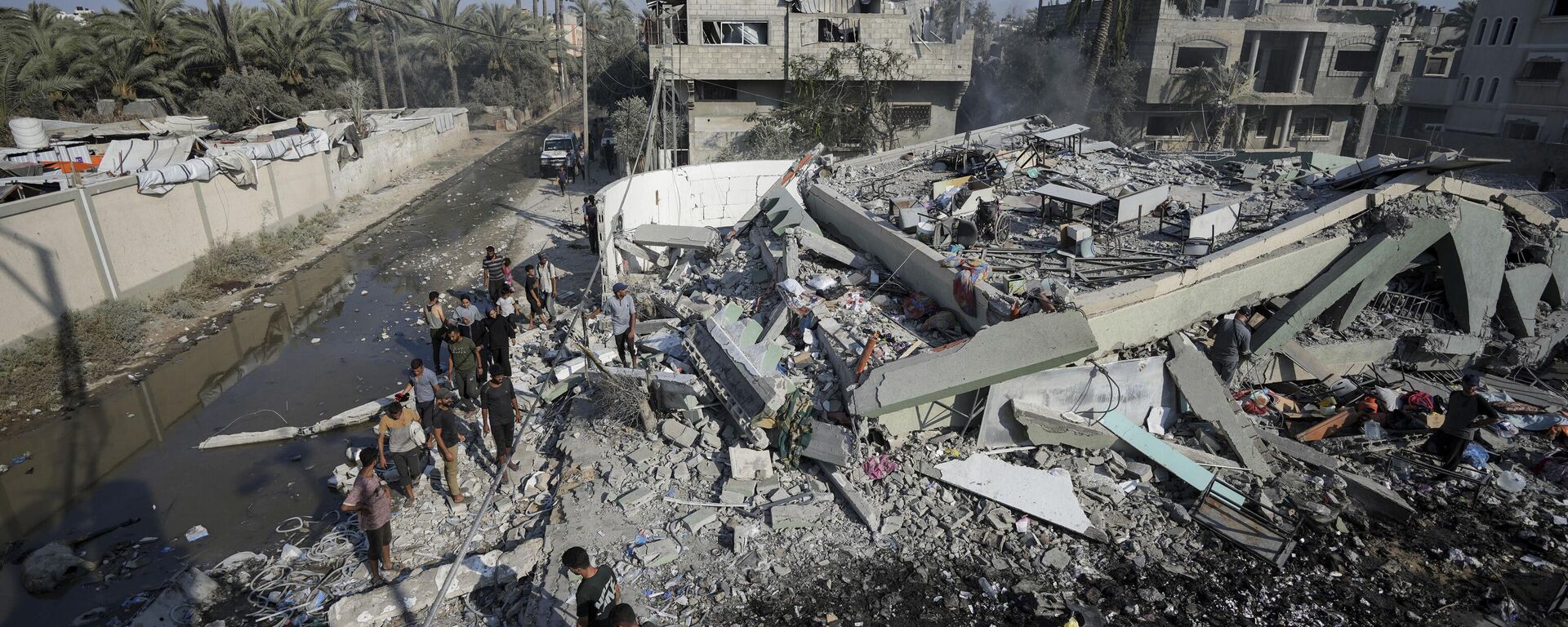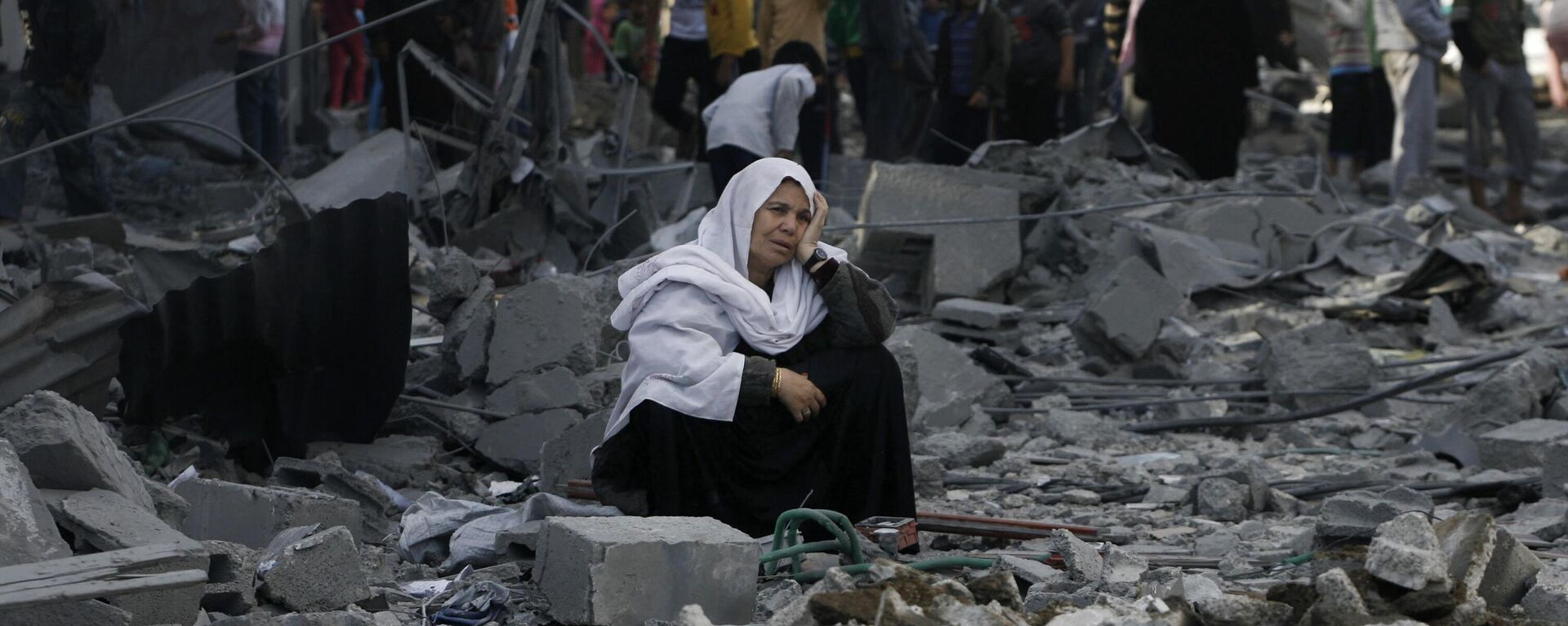'Actions Speak Louder Than Words': Fed-Up With Games, Hamas Reportedly Sits Out Talks
01:00 GMT 16.08.2024 (Updated: 01:01 GMT 16.08.2024)

© AP Photo / Fatima Shbair
Subscribe
While Hamas had previously agreed to a US-presented ceasefire deal, Israel complicated negotiations by creating new demands as a way to sabotage the deal. Iran has reportedly said that if negotiations between Hamas and Israel fail, they will attack Israel.
Ceasefire talks in the Middle East have resumed with the US, Israel, Egypt and Qatar reportedly making an appearance without representation being made from Hamas. The groups are working to secure a ceasefire for the Gaza Strip after the conflict has already claimed more than 40,000 lives, according to the Gaza Health Ministry.
Hamas has reportedly expressed that they no longer see the US as being able to bring about a deal that would solidify a ceasefire in the Gaza Strip. And following the assassination of one of their leaders as well as attacks on Iran in April, the US has continued to support Israel indefinitely.
Dan Kovalik, a human rights activist and author joined Political Misfits on Thursday to discuss the ongoing tensions in the Middle East. Kovalik suggested that Netanyahu will not allow a ceasefire deal to go through in order to save himself from being exposed to a political downfall as well as possible consequences for his alleged war crimes. The prime minister may even allow for Israeli captives to die in order to “save his own skin” the analyst suggested.
“I think it's worth trying [for a ceasefire deal] because people's lives are hanging in the balance. I mean, what's happening in Gaza is abominable. The famine is claiming lives. The atrocities against the people of Gaza continue every single day. So, obviously, the people of Gaza need a ceasefire,” Kovalik explained. “So that seems to me worth doing it for that reason alone.”
“Other people have interest in it, like the Biden administration, because they're getting a lot of pressure from their base to end this thing and they know that this - as long as this war continues, it's going to drag down the [US Vice President] Kamala Harris campaign,” the analyst explained, before noting that the Democratic National Convention is being held in Chicago next week where he predicts major pro-Palestinian protests to take place.
“...it's also clear, by the way, when [we] say the Israelis don't want a ceasefire that what we really mean is that [Israeli Prime Minister] Benjamin Netanyahu does not want a ceasefire,” Kovalik added. “He seems to be single-handedly holding this up for his own personal reasons, trying to avoid the inevitable corruption charges that await him when this war is over.”
A report from a Qatar media source revealed that Israel had launched a directive at the start of the war in the Gaza Strip that allows for the killings of captives taken by Hamas on October 7. The Hannibal Procedure, Hannibal Protocol, or Hannibal Directive allows IDF members to use any force necessary in order to prevent Israeli soldiers from being captured and even allows for captured soldiers to be killed.
Recent reports also revealed that IDF soldiers are carving their way through tunnels and buildings by using civilians to protect themselves from possible booby traps. According to one report, the practice became so common amongst Israeli soldiers that it could be considered a “protocol”. The reports were first made by the executive director of Breaking the Silence, which is a group founded by Israeli combat veterans hoping to expose military abuses.
“That they will [gladly] sacrifice Israeli soldiers and civilians for the purposes of, again, not having to even negotiate with Hamas about trading prisoners, right? They know if Hamas has prisoners that's gonna open up the need for negotiations to get Palestinian prisoners back and they just don't want to do that,” the analyst explained.
“So, again, I think what it shows is they don't care about their own people and that's why you see these protests in Israel because a lot of people understand that. That these lives are completely expendable and certainly for Netanyahu they're completely expendable. He, I think for him he'd be glad if they all just die so that it takes that issue away from the equation.”
Tensions in the Middle East are growing as Israel anticipates a retaliatory attack from Iran in response to the assassination of Hamas political chief Ismail Haniyeh. The US has expressed their full support of Israel, and approved an $18.82 billion sale of 50 F-15IA multirole fighter jets and other related equipment to the Israeli government, the Defense Security Cooperation Agency (DSCA) said on Tuesday.
Roughly 100 people were killed this weekend from a bombing attack in which US-provided missiles were used. At least 6,000 displaced Palestinians were being housed at the al-Taba’een (or Al-Tabin) school when bombs struck the school in the early hours of the morning on August 10, said Mahmoud Bassal, the Gaza civil defense spokesman. Images posted to social media show the violent impact of the bombs, as unrecognizable limbs and other charred pieces of bodies had to be collected in bags and weighed in order to make a best guess as to who the remains may have belonged to.
“...what they're calling arms sales to Israel, but they'll never pay for those arms. It's gonna be a grant of arms to Israel even after these horrible videos have come out about gang rape by Israelis of Palestinian prisoners, and the terrible bombing of that school over the weekend that killed 100 to 150 people where they're only knowing how many people died by the weight of the remains that they collected. I mean, that's how horrible this thing is,” Kovalik said.
“Actions speak louder than words and if you keep arming these atrocities, you're gonna keep getting atrocities. That's what it comes down to," said Kovalik of the US arms sales to Israel.
“Israel doesn't learn lessons and they don't listen to reason. Again, you have a country that is founded on many myths and when you have that situation, when you base your strategies on myths you don't end up with good results,” the labor attorney and human rights activist explained.
Iranian Supreme Leader Ali Khamenei has vowed to retaliate for the assassination of Hamas negotiator Ismail Haniyeh in Tehran whom he referred to as a “dear guest in our home”, though speculation about how or when Iran will strike continues.
A senior Iranian security official warned that if Israel’s ceasefire talks with Hamas fall through then Iran will attack Israel, an American news source reported on Tuesday. Iran also threatened retaliation on the suspicion of Netanyahu delaying negotiations with Hamas. US President Joe Biden acknowledged the influence that the ceasefire deal will have on Iran’s threats and admitted that the process to a ceasefire deal is “getting harder” but said he is “not giving up”.
“...let's state the obvious. Iran is the grown-up in the room here,” said Kovalik, regarding the ongoing tension between Israel and Iran. “Even the US and Europe recognized this by trying to convince them not to retaliate, right, because they know that actually there's a chance they could convince them of that. So, we have to start with that. And, as you say, they haven't flown off the handle. They haven't done something rash. They're waiting.”
“It appears - it doesn't just appear - what they're saying is they would gladly not retaliate if Israel agrees to a ceasefire with Hamas. So, they are willing to trade their own right to retaliate in order to end this genocide in Gaza, which I give Iran a lot of credit for. Now, I think there are discussions that are being had along those lines. So they're not going to retaliate till they exhaust those discussions,” Kovalik explained.
“Again, Iran acts in very constrained ways. I think they have to do something, and they have to do something fairly dramatic that the world can see because they just can't allow these provocations to continue without a serious response or the provocations will continue,” he added. “So, I think you'll see something rather serious, but I think still Iran wants to signal in whatever they do that they do not want a wider conflict because they don't.”



